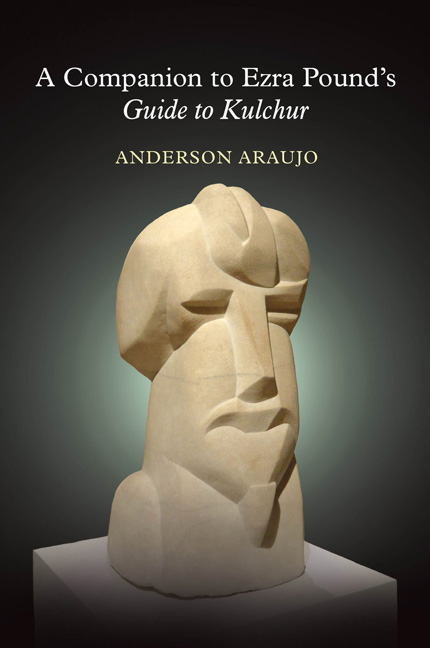Book contents
- Frontmatter
- Contents
- Acknowledgments
- Abbreviations
- Introduction
- Guide to Kulchur
- Part I
- Section I
- Section II
- Part II
- Section III
- Section IV
- Part III
- Section V
- Section VI
- Part IV
- Section VII
- Section VIII
- 29 Guide To Kulchur
- 30 The Proof Of The Pudding
- 31 Canti
- 32 The Novel And So Forth
- 33 Precedents
- 34 On Arriving And Not Arriving
- 35 Praise Song Of The Buck-Hare
- 36 Time-Lag
- 37 The Culture Of An Age
- Section IV
- Part V
- Section X
- Section XI
- Part VI
- Section XII
- Section XIII
- Addenda: 1952
- Notes
- Index
29 - Guide To Kulchur
from Section VIII
- Frontmatter
- Contents
- Acknowledgments
- Abbreviations
- Introduction
- Guide to Kulchur
- Part I
- Section I
- Section II
- Part II
- Section III
- Section IV
- Part III
- Section V
- Section VI
- Part IV
- Section VII
- Section VIII
- 29 Guide To Kulchur
- 30 The Proof Of The Pudding
- 31 Canti
- 32 The Novel And So Forth
- 33 Precedents
- 34 On Arriving And Not Arriving
- 35 Praise Song Of The Buck-Hare
- 36 Time-Lag
- 37 The Culture Of An Age
- Section IV
- Part V
- Section X
- Section XI
- Part VI
- Section XII
- Section XIII
- Addenda: 1952
- Notes
- Index
Summary
Haydn's melodic line up to Mozart's: Austrian classical composer Joseph Haydn (1732–1809) greatly revered Mozart's prodigious talent. In 1785, Mozart dedicated to the esteemed elder composer six quartets for violin, viola, and cello, known as the “Haydn quartets.” Pound prized melody foremost among the elements of music, above harmony, tonality, and form. “The modern musician says he can't hear a melody till it's harmonized,” he inveighs in Antheil and the Treatise on Harmony—“This is utter atrophy … “DAMN it all, the melody contains the root of the matter” (cf. note GK 365–66).
Bartok: Cf. note GK 134–35.
“And pause a while from letters to be wise”: Paraphrase of a couplet in Johnson's The Vanity of Human Wishes, “Deign on the passing World to turn thine Eyes, / And pause awhile from Learning to be wise.”
Stendhal: Pseudonym of Marie-Henri Beyle (1783–1842), French novelist much admired by Pound. In “How to Read,” Pound highlights Stendhal's most celebrated novels, Le rouge et le noir (1830) and La chartreuse de Parme (1839), alongside Flaubert's novels, as prose touchstones for poets.
Don Juan: Epic comedy composed by the Romantic English poet Lord Byron (1788–1824). Published in stages from 1819 to 1824, Don Juan is a long poem in ottava rima, divided into seventeen cantos.
You can't Goya and Ambrogio Praedis at the same time: Cf. note GK 28.
Pius’ last encyclical (against communism): Pope Pius XI issued this encyclical in Rome on March 19, 1937, denouncing the “imminent danger” of “bolshevistic and atheistic communism, which aims at upsetting the social order and at undermining the very foundations of Christian civilization” (cf. note GK 76).
The genius of Mussolini …* * * * * ** * * ***
- Type
- Chapter
- Information
- A Companion to Ezra Pound's Guide to KulcherGuide to Kulcher, pp. 222 - 224Publisher: Liverpool University PressPrint publication year: 2018



